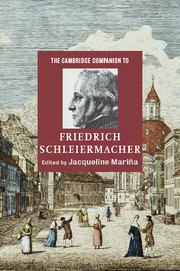Book contents
- Frontmatter
- Introduction
- Part I Schleiermacher as Philosopher
- Part II Schleiermacher as Theologian
- 6 Shaping an academic discipline: the Brief Outline on the Study of Theology
- 7 Sin and redemption
- 8 Christology and anthropology in Friedrich Schleiermacher
- 9 Schleiermacher’s understanding of God as triune
- 10 Providence and grace: Schleiermacher on justification and election
- 11 Schleiermacher’s Christian Ethics
- 12 Schleiermacher’s exegetical theology and the New Testament
- Part III Culture, Society, and Religion
- Schleiermacher Biography
- References
- Index
6 - Shaping an academic discipline: the Brief Outline on the Study of Theology
from Part II - Schleiermacher as Theologian
Published online by Cambridge University Press: 28 August 2006
- Frontmatter
- Introduction
- Part I Schleiermacher as Philosopher
- Part II Schleiermacher as Theologian
- 6 Shaping an academic discipline: the Brief Outline on the Study of Theology
- 7 Sin and redemption
- 8 Christology and anthropology in Friedrich Schleiermacher
- 9 Schleiermacher’s understanding of God as triune
- 10 Providence and grace: Schleiermacher on justification and election
- 11 Schleiermacher’s Christian Ethics
- 12 Schleiermacher’s exegetical theology and the New Testament
- Part III Culture, Society, and Religion
- Schleiermacher Biography
- References
- Index
Summary
The fact that in such knowledge the knower’s own being comes into play certainly shows the limits of method, but not of science.
(Gadamer, Truth and Method)Few theologians in the history of the Christian church have been as rigorously self-reflective about the craft of theology as was Friedrich Schleiermacher. Always a master teacher, Schleiermacher developed a curriculum for Protestant theology that reflects a penchant for relating thought and practice. In his hands, theological methods must be engaged with actual history and the life of religious institutions. Of course, as an intellectual pursuit a secure starting point for theology must be given. Like Plato, arguably the favorite of his Greek predecessors, Schleiermacher's architectonic cast of mind insists on linking matters of intellectual principle and foundational insight to their specific, embodied details. Although less philosophical in some respects, his preferred Reformation theologian, John Calvin, exemplified an equally bold ambition and similarly systematic cast of mind.
Not surprisingly, the question of theological method runs deep in modern Christian thought. With the dawn of historical criticism and Newtonian physics few verities of the Christian faith could any longer be taken for granted. After the work of dramatist-critic Gotthold Ephraim Lessing (1729-81) the gulf between accidental truths of history and eternal truths of reason seemed permanent. At the end of the eighteenth century rival theological camps staked out positions, none of which Schleiermacher viewed with satisfaction. The Kantian view, in which Jesus exemplifies the moral ideal of practical philosophy, set no store by Christian doctrine, biblical theology, and the life of the church. That of a biblically based supernaturalism, in which the Bible's miracles prove the deity of Jesus, sought to shield this position from rational assaults. The speculative rationalism of Fichte and Hegel, Schleiermacher's successive philosophical colleagues in Berlin, subsumed the claims of theology beneath a dominant philosophical truth.
- Type
- Chapter
- Information
- The Cambridge Companion to Friedrich Schleiermacher , pp. 111 - 128Publisher: Cambridge University PressPrint publication year: 2005
- 2
- Cited by



